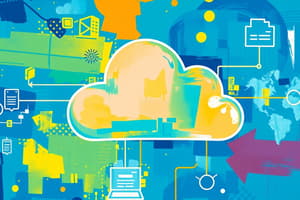Podcast
Questions and Answers
Which of the following best describes cloud computing?
Which of the following best describes cloud computing?
- Managing on-premises infrastructure
- Accessing computing resources via the internet (correct)
- Storing data on physical servers
- Purchasing enterprise applications
What does a cloud services provider (CSP) do?
What does a cloud services provider (CSP) do?
- Configure supporting hardware
- Host computing resources at a remote data center (correct)
- Manage on-premises infrastructure
- Offer enterprise applications
How does cloud computing help lower IT costs?
How does cloud computing help lower IT costs?
- Providing enterprise applications for free
- Reducing the cost of software installation
- Eliminating the need for networking capabilities
- Offloading the costs of purchasing and managing infrastructure (correct)
What is one advantage of using cloud computing in terms of agility?
What is one advantage of using cloud computing in terms of agility?
Who can benefit from cloud computing?
Who can benefit from cloud computing?
Flashcards are hidden until you start studying
Study Notes
Cloud Computing Overview
- Cloud computing refers to the delivery of computing services, including storage, processing power, and applications, over the internet (“cloud”) rather than through a local server or personal computer.
- It allows users to access and store data remotely, promoting flexibility and scalability.
Role of Cloud Services Provider (CSP)
- A CSP offers a range of services including Infrastructure as a Service (IaaS), Platform as a Service (PaaS), and Software as a Service (SaaS).
- Their responsibilities encompass managing and maintaining servers, storage, databases, and network resources, ensuring uptime and security for users.
Cost Reduction in IT via Cloud Computing
- Cloud computing minimizes the need for physical hardware, decreasing capital expenditure for businesses.
- Subscription-based pricing models reduce upfront costs and enable pay-as-you-go spending, making it easier for organizations to manage budgets.
Agility Advantage of Cloud Computing
- Cloud computing facilitates rapid deployment of applications and services, allowing businesses to adapt quickly to market changes.
- This agility enables organizations to innovate faster and respond to customer demands more effectively.
Beneficiaries of Cloud Computing
- Small and medium enterprises (SMEs) gain access to advanced technology without substantial investments in infrastructure.
- Large enterprises benefit from enhanced scalability and flexibility to manage fluctuating workloads.
- Startups can leverage cloud resources to launch products swiftly while minimizing financial risks.
Studying That Suits You
Use AI to generate personalized quizzes and flashcards to suit your learning preferences.




